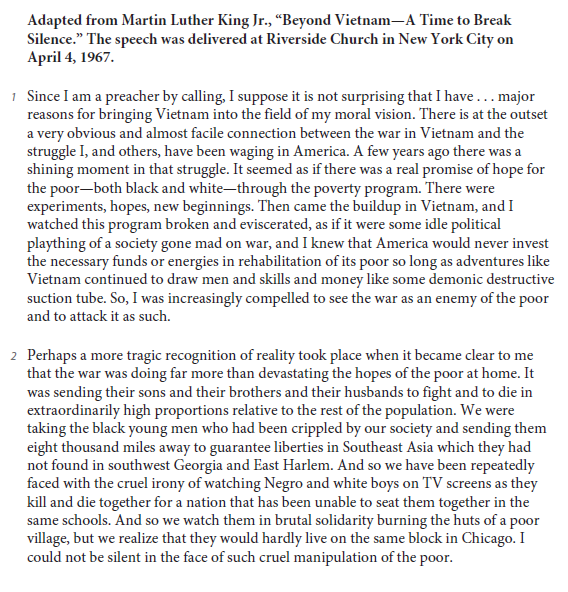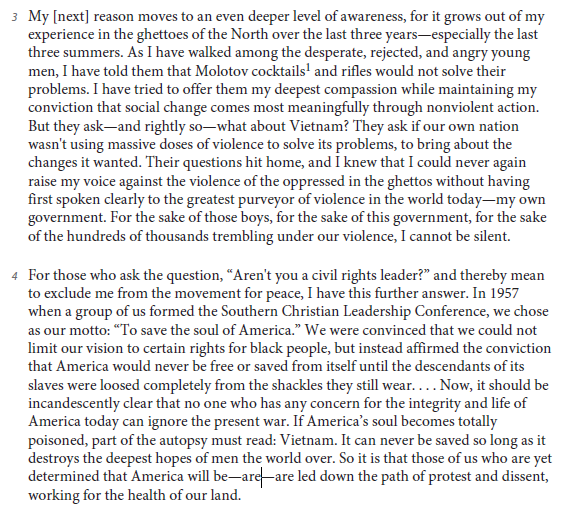新SAT写作真题与范文(二)
高能成就高分,但高分并不一定高能。如何能让学生既能高分也能高能呢?纵观那么多考SAT的学生,为什么大部分都考不到理想分数,而被成绩刷下来呢?除了不断的训练SAT写作真题和范文以外,到底应该怎么做才能提高学生的成绩呢?以下的SAT写作范文来自新航道SAT培训教研组,针对目前还苦于无从下手的考生们希望这些SAT写作范文能够给到你们帮助。
SAT写作真题:


SAT写作题目:
Write an essay in which you explain how Martin Luther King Jr. builds an argument to persuade his audience that American involvement in the Vietnam War is unjust. In your essay, analyze how King uses one or more of the features listed in the box above (or features of your own choice) to strengthen the logic and persuasiveness of his argument. Be sure that your analysis focuses on the most relevant features of the passage. Your essay should not explain whether you agree with King’s claims, but rather explain how King builds an argument to persuade his audience.
In his speech titled “Beyond VietnamOOA Time to Break Silence”, the famous social activist Martin Luther King Jr. uttered his condemnation of America’s involvement in the Vietnam War. Such an argument is made convincing mainly by Martin’s personal anecdote and is reinforced by the use of such rhetorical devices as contrast and rhetorical repetition.
To make a tenable argument, King needs to approach the topic discreetly with a wellOjustified reason. And he has made this clear at the very beginning of the speech, claiming it is to do with his role as a preacher who naturally cares about people’s morality. After a confession of the disillusion of his earlier dreams concerning the poverty programs, where “there were experiments, hopes, new beginning”, King has become increasingly sober and watches the program “broken and eviscerated”; he realizes that the country would rather invest in Vietnam Wars rather than the rehabilitation of the poor in its own country. Therefore, he is forced to “see the war as an enemy of the poor and attack it” vehemently.
His conviction is hardened with a second realization: the “War was doing far more than devastating the hopes of the poor at home”, rather, it manipulated everyone involved, especially those poor black men who had been sent to the War. They did not enjoy equal rights as the whites back in their own country but were fighting for liberties of another nation; they were poor people themselves, but they were burning down huts of impoverished locals on foreign soil. They were fighting and dying for their nation which could not treat them fairly and equally. Such brutal irony was highlighted.
Again, to make his argument more credible, King adds another anecdote: his personal encounter with people from the ghettos in the North. As he preaches on nonviolent action to secure meaningful social change to “the desperate, rejected, and angry young men”, he is interrogated and realizes that his own country is doing the opposite to get what it wants, “using massive doses of violence to solve its problems”.
To conclude the speech, Martin further reiterates his clinging to pacifism and maintains that the war in Vietnam can never save the nation but will deprive of people of their deepest hopes.
In this way, the logic behind the argument is clear enough. Rather than giving people hopes and equality, the war worsens the situation and drags the whole nation into the abyss of pain (Or “ like some demonic destructive suction tube “ as King puts it) and is thus a waste of energies and resources, which could have been invested on improving the welfare and benefits of its own poor citizens. The war also costs innocent lives who are dying for the nation and deserve more than they did get. And finally, the war solves no practical problems for the US and merely poisons the spirit of all people.
In terms of stylistic and persuasive elements, Martin’s employment of contrast and rhetorical repetition is worth mentioning. He draws a contrast between those tricked soldiers who were sent to war by saying that “We were taking the black young men who had been crippled by our society and sending them eight thousand miles away to guarantee liberties in Southeast Asia which they had not found in southwest Georgia and East Harlem.” In this way, strange and faraway Vietnam is made tangible, and the situation clear where the irony lies. Also, he asserts that, “we have been repeatedly faced with the cruel irony of watching Negro and white boys on TV screens as they kill and die together for a nation that has been unable to seat them together in the same schools. And so we watch them in brutal solidarity burning the huts of a poor village, but we realize that they would hardly live on the same block in Chicago. “ Bubbles of the dreams fall apart and the harsh reality reveals itself. What concerns the young men remains largely unchanged while they are dying for little value.
The use of rhetorical repetition is most evident in the sentence “For the sake of those boys, for the sake of this government, for the sake of the hundreds of thousands trembling under our violence, I cannot be silent.” which has given much weight to the justice of his speaking out what has to be said, namely, the war has to be stopped; and the US definitely has no role to play in it.
2016SAT真题下载:2016年10月1日亚太SAT真题PDF下载、2016年10月1日北美SAT真题及答案下载、2016年5月亚太SAT真题及答案下载、2016年5月北美SAT真题及答案下载







